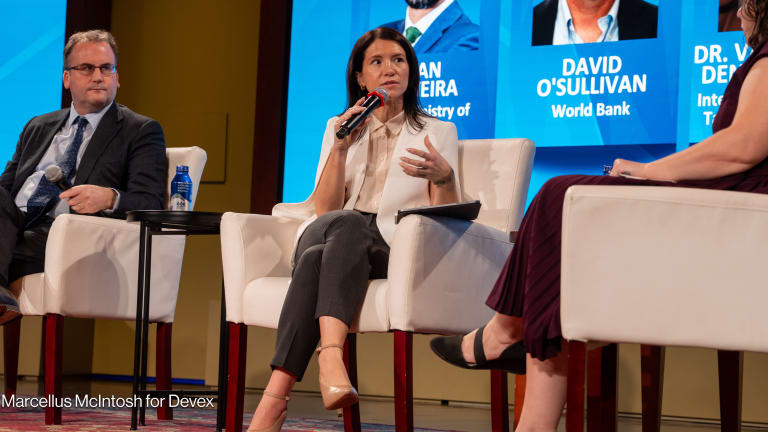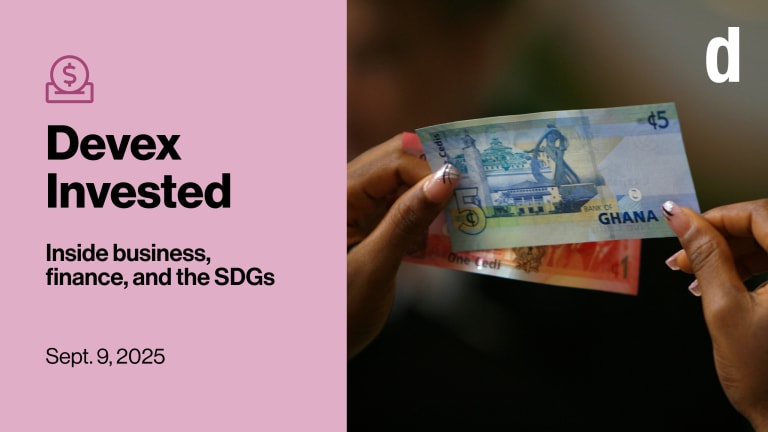
MANILA — Michael Bloomberg, the billionaire philanthropist wearing dual hats as ambassador for noncommunicable diseases and climate change envoy, shared his thoughts Thursday during the World Bank Spring Meetings on the role of taxes in combating NCDs and how to induce policy change.
In a one-on-one interview with the International Monetary Fund Managing Director Christine Lagarde, Bloomberg discussed how NCDs place a particular burden on people with little education and few resources. Tobacco companies, for example, are advertising more and more in places where people are bereft of education to understand how smoking can lead to death, he said.
See more coverage of the World Bank Spring Meetings:
► Q&A: The World Bank's pivot to fragile states
► Tackling corruption: 6 takeaways from the World Bank Spring Meetings
►Trump administration takes aim at World Bank salaries
►Concerns raised about World Bank support for private education
Bloomberg continues to champion the role of taxes in curbing cancer, obesity, and more, even going so far as to paint it as a life or death situation.
“I listen to people saying, ‘oh, we don’t want to tax the poor.’ Well, we want the poor to live longer so they can get an education and enjoy life. And that’s why you do want to do exactly [that] … The question is: do you want to pander to those people, or do you want them to live longer?” he said.
“It’s like saying ‘I don’t want to stop using coal, because coal miners will go out of work, will lose their jobs.’ We have a lot of soldiers in the United States, in the U.S. Army, but we don’t want to go start a war just to give them something to do... But the comparison is a life or a job, or taxes or life. Which do you want to do? Take your poison,” he argued.
Here are other snippets from the conversation:
On trade wars: “When we start having trade wars, we’re going to hurt a lot of people. And it’s the same people that get hurt every time. We always talk about helping the poor, and then we do things that really hurt the poor.”
On the efficiency of sin taxes: “Taxes work in some cases and not [in] others. One example, if you want to get young people to stop smoking, raise taxes. In America — and it’s not true in other parts of the world — if you want to get older people to stop smoking, taxes have relatively little impact. It is the fact that you can’t smoke in most places. We have laws in most cities in America, where you can’t smoke in the workplace, you can’t smoke in the restaurant, you can’t smoke in the theater. And pretty soon if I can’t smoke anywhere, I stop smoking. But adults will stop feeding their families before they stop feeding their addiction. They will find the money to buy cigarettes at almost any price. Young people don’t have the disposable income.”
On whether governments should raise taxes immediately versus gradually: “I’ve always been a believer that if it’s controversial, pulling the band-aid off right away is the only way to do it. If you try to pull off the band-aid slowly, you’re never gonna get to the second step.”
On the role of finance ministers in health: “Finance ministers think about maximizing resources, and the way you do that is to, for example, reduce the health care needs of the population. And if you can do that with a tax, it’ll raise you some money — which is good if you are a finance minister, you always want more money — but the main thing it’s going to do is ... reduce your expenses. And so a finance minister, I think, has responsibilities on both sides of the income statement ... even if they think, ‘it’s not my job to worry about the health’. OK. But it is your job to increase revenue and reduce expenses. And this is how you do it.”
On making NCDs and climate change relevant now: “You’re dealing with a more difficult world made more difficult ... by social media — where you can say anything [you want] ... Cigarette companies say smoking is good for you. Well, that’s just not true. And how do you convince … [people]? In simple terms, you say, look your neighbor just died from cancer. They were smoking. Your other neighbor is still alive and he’s not [smoking]. Maybe that’s a way.”
“We talk about climate change and what’s gonna happen in 2050. Don’t waste your time talking about that. I don’t know about you, but [with] my age I’m not gonna see 2050. What I am gonna see is right now if my grandchildren get taken to the hospital with an asthma attack, or if my daughters and I come down with stomach cancer from drinking polluted water. So if you change the climate stuff to the environmental focus, you will get people’s attention a lot more, and they will say, ‘oh I do care about that, and we gotta clean the air because my daughter is suffering from asthma.’ 2050 is [a] hard ... concept [to get] around.”
On artificial intelligence: “Maybe you can do an operation with a computer, but [as far as] holding your hand in bed when you want some [emotional] support, computers are not going to do that for a very long time.”
For more coverage of NCDs, visit the Taking the Pulse series here.









